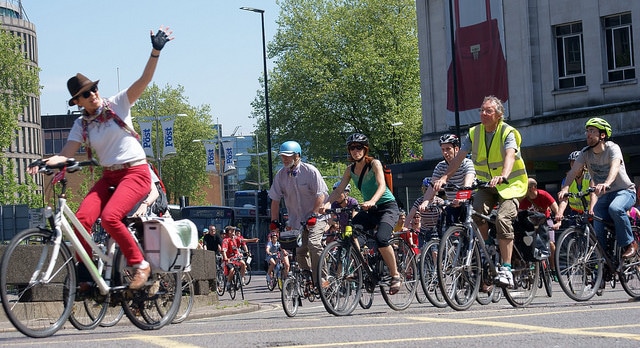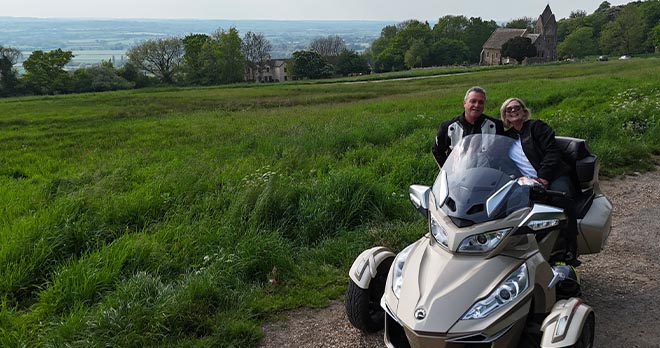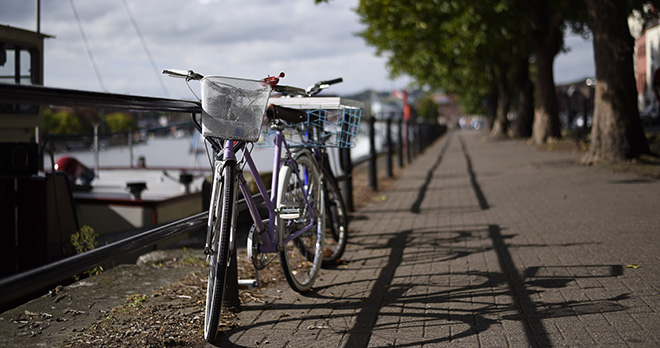Is Bristol UK’s future cycling capital?

Photo credit: Sam Saunders https://www.flickr.com/photos/samsaunders/
According to the report released recently by Bristol City Council, the number of Bristolians who cycle to work has almost doubled in the last 10 years and is now 7.6% of the city’s population. Cycling to work is particularly popular for the under 40s with the majority of people (57% of the under 40s) commuting to work without using their car.
Good news for the city
This is excellent news for the city. Firstly, the health benefits are obvious: when so many doctors are reporting the current strain and predicted cost to the NHS of dealing with obesity, and diabetes, cycling is a form of exercise which tackles these issues. It is also good news for those who choose or need to use their car. I recently saw a poster in Bristol which struck a cord. It was at the side of a busy road and said “You are not stuck in traffic, you are traffic”.
Bristol has been receiving investment as one of UK’s first cycling cities since 2008, and these statistics are a clear sign it’s paying off.
The new cycle strategy
The proposed new cycle strategy for the city, if approved, could signify a significant further investment to make cycling safer. The draft cycle strategy is available at www.citizenspace.com and sets the following targets for the next three years:
a. make cycling simpler
b. make cycling safer
c. make cycling more attractive
d. make Bristol a better place.
The strategy makes encouraging references to the cycling culture in cities such as Amsterdam and Copenhagen where cycling promotes residents’ fitness and happiness and results in lower pollution levels. These two great cycling cities demonstrate that it is obviously a sustainable transport model for a growing city. A cornerstone of the strategy is to make cycling safer by reducing vehicle speeds, creating cycle routes that are protected from traffic, maintaining cycle networks and providing safety training.
Is enough being done?
As a personal injury lawyer specialising in acting for injured cyclists, I am upset and when I come across cases where accidents could be avoided had the motorist taken extra care to look out for cyclists or had there been some sort of segregation on busy routes.
Having dealt with numerous cycling injury cases, I am still a firm believer in cycling: it is very satisfying to be able to succeed with claims so that injured cyclists have the rehabilitation they need to get back on the bike and the compensation to replace their damaged bicycle and kit.
Just down the road from Bristol, in Bath, a local newspaper recently reported that 42% of teens would like to be able to start cycling or cycle more but over a third of them say that the lack of safe routes stops them from doing so. To me, the solution is obvious: there needs to be a continuing investment in the infrastructure to make cycling safer and simpler so that we can all enjoy the benefits for the environment and our health.
About Mark Hambleton
Mark Hambleton is a specialist personal injury lawyer and a keen cyclist – in his own words, “solicitor and cyclist in equal measure.” Last year alone, he cycled from John O’Groats to Land’s End (963 miles) in 9 days in aid of the Bath Rugby Foundation and completed the Bike Bath challenge as part of the Withy King team. In preparation for Bike Bath 2014, Mark cycled to Gloucester and back just last week-end. Not to mention that he also cycles to work every day – 29 miles round trip! Mark is a keen advocate of cyclists’ safety and regularly speaks up on safety-related matters.
Got an opinion on cycling in Bristol to share? Follow Mark on Twitter

Find out more about making a cycling accident claim
Our specialist cycling accident solicitors are here to help you understand the process of making a claim.







